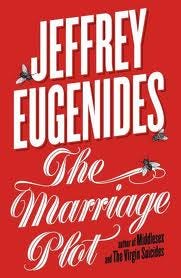Truth and fiction
A little while ago I wrote a short blog post about the sense I have, when telling some kind of folk story well, of speaking the truth. I've been thinking about this again today, after a week's leave when I read a couple of fine novels: Jane Urquart's Away and Jeffrey Eugenides' The Marriage Plot.
As I read each of these, I felt myself being simultaneously being taken far away into unfamiliar worlds, and deeper into my own experiences and internal worlds. Both novels took me to a place that seemed more convincingly real and true than some excellent non-fiction I've been enjoying recently. Cleverer people than I have the words to explain what this is all about; I just notice and enjoy it.
There's an extended section in The Marriage Plot that describes one character's descent into a debilitating manic-depressive state. I was taken into the experience, accepted it without question as authentic and true, not as if it described what such an episode is always like for everyone suffering from manic-depression, but authentic and true of this person's experience.
This connection between fiction and truth matters to me at the moment because I'm in the early stages of a project with colleagues to write some fiction which attempts to tell some truths about early career teaching.
Not the only truth, of course, but some truths that can be trusted, that draw on informed and deep reflection and active exploration of actual experiences, that attempt to transcend limits imposed when we 'stick to the facts' and restrain our imaginative capacity to see more.
It particularly matters to me - this connection between truth and fiction - because some of my colleagues question the reasons why I should want to go beyond the affordances of rigorous and honest case studies.
Why not just let beginning teachers tell their stories, and allow readers to make what they will of it?
By trying to write a fiction with these beginning teachers, aren't I just trying to impose my own version of the truth by playing around with the stories they tell me?
I have sensible counter arguments. I tell my colleagues they don't understand our process, where it's not me imposing my truth on their stories but the four of us imaginatively exploring the terrain together. I tell my colleagues that we have to think about the importance of my co-researchers' careers, and that therefore we can't just use their stories; we have to alter them to such an extent that no actual people, places or events ever appear. I argue, too, that case studies are as selective of the 'facts' as any ethically written fiction.
These are sensible and real arguments. But they're not the main one.
I want to write some educational fiction because I think fiction can get us closer than any other kind of writing to a certain kind of truth, an account which is in some crucial ways closer to the actual complex reality that we live and need to negotiate our way through.





